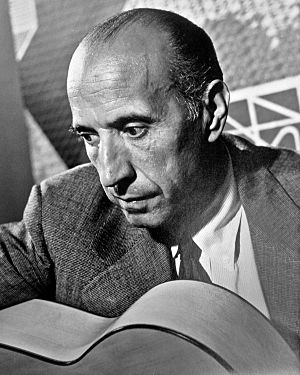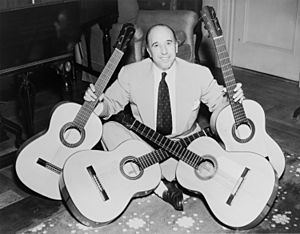Carlos Montoya facts for kids
Quick facts for kids
Carlos Montoya
|
|
|---|---|

Montoya circa 1950s
|
|
| Background information | |
| Birth name | Carlos García Montoya |
| Born | 13 December 1903 Madrid, Spain |
| Died | March 3, 1993 (aged 89) Wainscott, New York, U.S. |
| Genres | Flamenco music |
| Occupation(s) | |
| Instruments | Guitar |
Carlos García Montoya (born December 13, 1903, died March 3, 1993) was a famous flamenco guitarist from Madrid, Spain. He helped create the modern style of flamenco music that many people enjoy today.
Contents
Early Life and Learning
Carlos Montoya was the nephew of another famous flamenco guitarist, Ramón Montoya. He started learning guitar from his mother, "la Tula." Later, a barber named Pepe el Barbero taught him more. After about a year, Carlos had learned all Pepe could teach.
He then sought out other flamenco guitarists to learn from them. By age fourteen, Carlos was already playing in "cafes cantantes" in Madrid. These were places where flamenco singing and dancing were very popular. He played for artists like Antonio de Bilbao and La Macarrona.
A Career on the World Stage
In the 1920s and 1930s, Carlos Montoya performed widely. He played in Europe, North America, and Asia with artists like La Teresina. When World War II began in 1939, he was touring in the United States. He decided to stay there and later became a U.S. citizen.
This period in the U.S. became his most successful time as a musician. He brought his exciting flamenco style to many concert halls and universities. He also performed with orchestras. During these years, he made many recordings for labels like RCA Victor and Folkways. He played traditional flamenco songs such as Farruca.
By the end of the war in 1945, Carlos Montoya's music had grown. He started to include elements of blues, jazz, and folk music in his performances. He toured the world again and was the first flamenco guitarist to tour with symphonies and orchestras. He became a leading figure in flamenco music in the U.S. He also appeared on television and recorded over forty albums. One notable album was Suite Flamenco, a concerto he played with the Saint Louis Symphony Orchestra in 1966. His performances helped make flamenco guitar music popular all over the world.
Developing a Unique Flamenco Style
Montoya is known for changing flamenco guitar music. Before him, it was mostly used to accompany dancing. He helped make it a separate style of music on its own. He mixed flamenco with other types of music to create his own special sound. This made him an international star.
Some traditional flamenco students did not fully appreciate his style. They felt it was less traditional than other flamenco music. This might have been because he sometimes changed the traditional compás (rhythm) of flamenco. Many of his songs did not always keep a perfect tempo. They would speed up and slow down in a unique way. However, he was admired for the speed of his picados (a guitar technique). His fast and impressive playing helped him gain popularity on the international stage.
Death and Lasting Legacy
Carlos Montoya passed away on March 3, 1993, at the age of 89. He died of heart failure in Wainscott, New York, on Long Island. His niece, Rosa Montoya, is also famous. She helped introduce flamenco dance to many people in California through her studio in San Francisco.
Discography
| Year | Album Title |
|---|---|
| 1950 | Spanish Guitar Solos |
| 1957 | Flamenco Guitar |
| 1958 | Flamenco Fire |
| 1959 | From St. Louis to Seville |
| 1961 | Malaguena |
| 1961 | Carlos Montoya and His Flamenco Guitar |
| 1963 | Flamenco Antiguo |
| 1964 | Flamenco Concert |
| 1967 | The Artistry Of |
| 1996 | Flamenco! |
| 2004 | Guitar & Flamenco |
Filmography
- Carmen, la de Triana (1938)
See also
 In Spanish: Carlos Montoya para niños
In Spanish: Carlos Montoya para niños
 | William M. Jackson |
 | Juan E. Gilbert |
 | Neil deGrasse Tyson |


